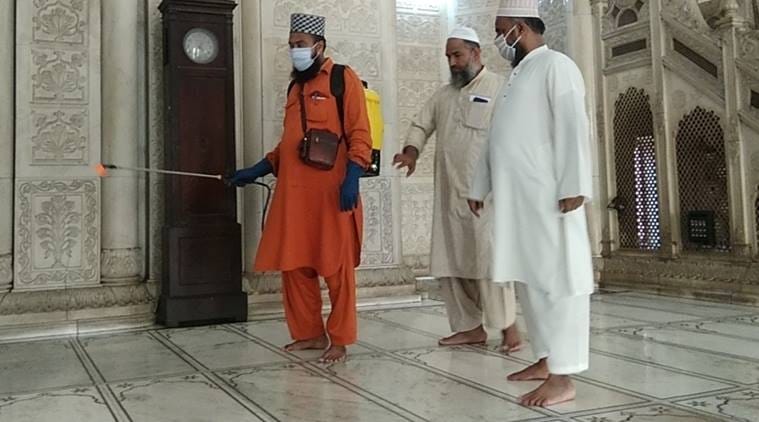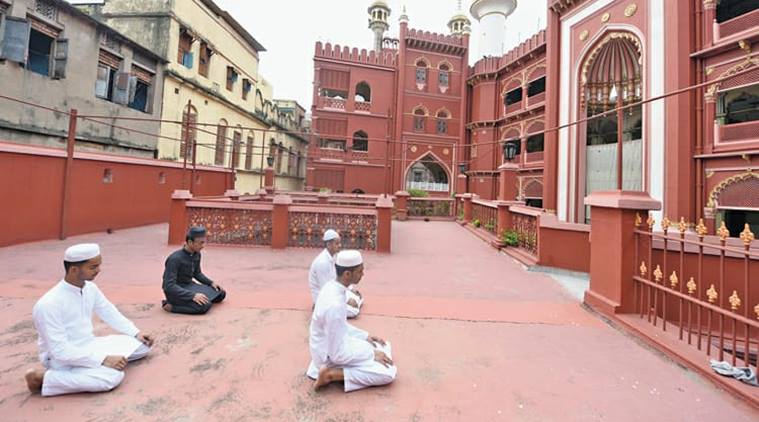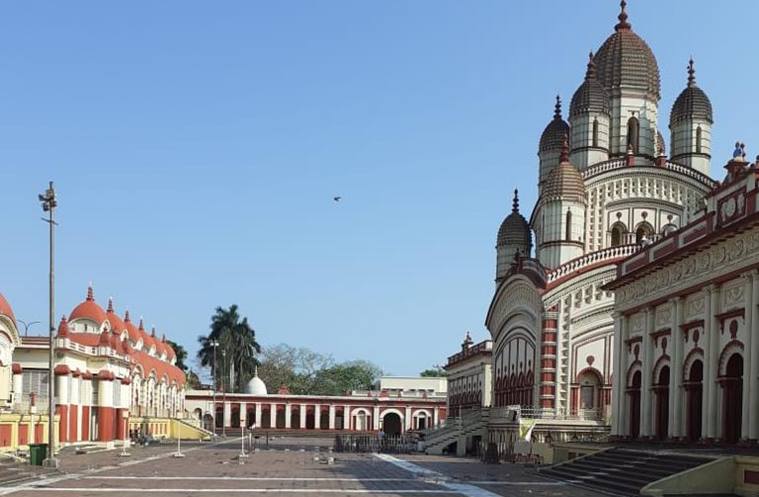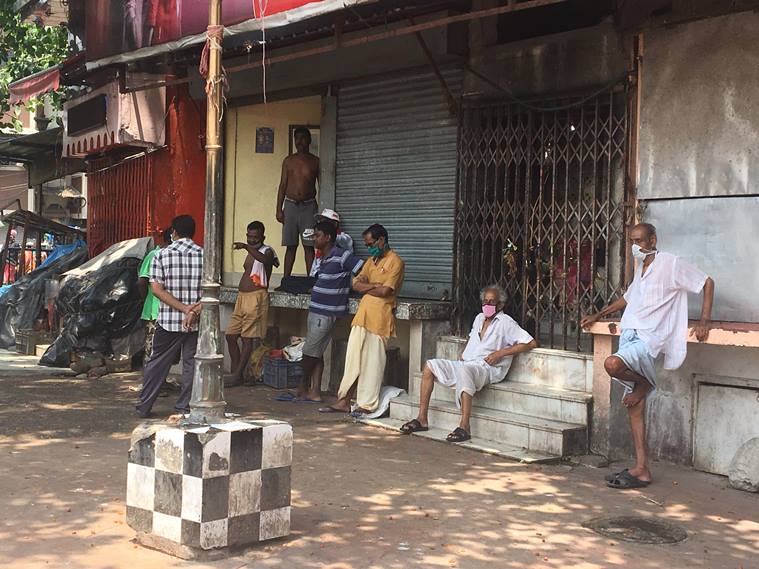 The closed gates of Kali Temple in Kolkata. (Express Photo by Neha Banka)
The closed gates of Kali Temple in Kolkata. (Express Photo by Neha Banka)
The coronavirus outbreak in India has led to a rethinking of how people practise their faith. For Christians and Muslims in Kolkata, the pandemic and the subsequent national lockdown coincided with two major festivals, Easter and Eid, both of which were celebrated in ways that the communities have never done before. Although the West Bengal government allowed places of worship to reopen following advisories on June 1, many religious institutions have chosen not to open their doors due to concerns of possible Covid-19 infections.
In April, when churches were forced to hold mass during the Easter week online due to the COVID-19 lockdown, for those accustomed to visiting the church to pray, it was particularly difficult. In two months, with the increase in coronavirus infections, those sentiments have changed for some. Josephine Gurung, 58, who would go to church whenever possible and felt strongly about her inability to do so during Holy Week, has chosen not to visit despite her local church having opened last week. “I think churches shouldn’t open. It is dangerous. I am missing church but mass is happening online and that is important to me,” says Gurung.
 Hand sanitiser being given to devotees who enter the Our Lady of Happy Voyage church in Howrah. (Photo credit: Efi Biswas)
Hand sanitiser being given to devotees who enter the Our Lady of Happy Voyage church in Howrah. (Photo credit: Efi Biswas)
Local markets began opening after the Indian government slowly began easing the lockdown, but many continue to step out in public spaces without face masks in violation of public health laws. “People are not responsible. They keep crying, saying ‘what will happen, what will happen’, but I went to New Market recently and people were out and about without masks and gloves. I went to drop something off at a school and the teachers were in the room, gossiping with face masks hanging below their chins.”
The lockdown has allowed Gurung to spend more time with her family and practise her faith differently. “People have become more religious at home. They have more time to pray because otherwise they are too busy,” she says.
Since the lockdown was initiated, the Archdiocese of Calcutta had started online prayer services, that many in the community availed of during the Holy Week and those services are continuing once a week.
“The situation was new and changed. People have prayed and reflected in their own homes in a relaxed way. It was a providential time from that perspective,” says Thomas D’Souza, Archbishop of Calcutta, acknowledging that people’s inability to visit church has impacted the way they pray.
The Archbishop has ordered churches to follow government regulations that allow only ten people wearing face masks inside the institution’s premises at any given time, and the regular sanitisation of surfaces. Now, Communion is now only given after the priest sanitises his hand.
 Sanitisation being carried out inside Nakhoda Masjid in Kolkata. (Photo credit: Nasser Ebrahim)
Sanitisation being carried out inside Nakhoda Masjid in Kolkata. (Photo credit: Nasser Ebrahim)
Mosques in Kolkata are scheduled to open on June 8, as allowed by the West Bengal state government. For the community, the fasting month of Ramzan and Eid celebrations were unusual this year because the mosques were closed and did not allow people to congregate for prayers. While the imams joined by not more than five people have been holding the farz (mandatory) part of the five namaz inside the mosques every day, people were asked to pray at home.
“Islam says that it is important to save lives. The lockdown does not mean that you do not pray, or do charity or read the namaz and observe Ramzan. You just do it at home,” says Nasser Ebrahim, trustee of the Nakhoda Masjid, one of the largest and most important mosques in the city.
“Things have changed and not for the better,” says Moinul Mullick, 31, a Howrah-based businessman. “It is not that we have to go to the mosque everyday to pray, but Friday prayers are important. People are not feeling comfortable with the idea of going to the mosques.”
Mullick says that for some people in the community, visiting a mosque for prayers, particularly on Friday, are important, but he believes that it is mostly older people in the community who feel strongly about it. For many people his age, Mullick says health concerns take precedence and he does not anticipate visiting mosques till concerns of COVID-19 infections persist.
 People praying inside Nakhoda Masjid in Kolkata following the rules of physical distancing. (Photo credit: Nasser Ebrahim)
People praying inside Nakhoda Masjid in Kolkata following the rules of physical distancing. (Photo credit: Nasser Ebrahim)
Ebrahim, along with other members of the administration of Nakhoda Masjid, has been preparing to open the 94-year-old mosque to the public on June 8 by giving it a thorough cleaning. The imam still holds daily prayers inside the mosque and floors are cleaned after each round of prayers because they involve the congregants bowing, bringing their faces in close proximity to the floor. Sanitiser machines have also been deployed and will be in use on a daily basis and the useof face-masks have been made compulsory.
Ebrahim knows that Id prayers at Nakhoda Masjid are important, but this year, there was little to be done. “Yes, it does hurt, but you have to adjust. Otherwise the illness will continue.”
At the 165-year old Dakshineswar Kali Temple on the banks of the Hooghly river, the temple administration is still considering when to reopen the iconic temple’s gates for devotees. “The state government had requested religious places to reopen on June 1, but temples are autonomous. Prior to opening the temple, preventive measures have to be put in place,” says Kusal Chowdhury, trustee and secretary of the temple.
 The empty complex of the Dakhineshwar Kali Temple in Kolkata, while the temple continues to remain closed. (Photo credit: Kusal Chowdhury)
The empty complex of the Dakhineshwar Kali Temple in Kolkata, while the temple continues to remain closed. (Photo credit: Kusal Chowdhury)
On any given day before the pandemic, some 30,000 devotees used to visit the temple and the temple administration is now concerned about managing the crowds while conforming to public health laws. Without ensuring that the required infrastructure is put in place for sanitisation and protection, the temple does not want to jeopardise the health of devotees as well as priests and support staff who work in the temple in various capacities. “In Hinduism, we believe that faith does not change but it becomes stronger when disaster strikes. We will overcome this because of our belief in the Goddess.”
“We are thinking of implementing thermal checks, security checks and sanitisation and we will only allow ten people to enter at a time. Nobody will be allowed to enter the sanctum and people will be asked to leave the temple premises quickly. Gatherings in the temple complex will not be allowed and people will not be allowed to enter Ramakrishna’s room. Facemasks will be mandatory,” says Chowdhury.
Hundreds of food stalls can be usually seen outside the Dakshineswar Kali Temple, but the temple authorities will only allow these establishments to offer takeaways. According to Chowdhury, the temple itself will open for only a few hours in the day. “This is a very temporary situation. The entire world has changed, everything will change, but spirituality will not change.” The temple’s plans are being implemented but the administration says it will need time to execute it the way they believe is necessary. “If any devotee falls ill, it will be our responsibility. It is not an easy job.”
 Priests sitting outside a closed Kalighat Kali temple wearing facemasks in Kolkata. (Photo: Neha Banka)
Priests sitting outside a closed Kalighat Kali temple wearing facemasks in Kolkata. (Photo: Neha Banka)
The 211-year-old Kalighat Kali temple in Kolkata is also in no hurry to open its gates. While a representative of the temple administration did not provide any clarity on when the temple would reopen, shopkeepers outside the temple told indianexpress.com that the temple administration was still considering how best to manage crowds in accordance with prescribed public health laws when they were to reopen.
Smaller neighbourhood temples in the city however, that do not attract large groups of people appear to have opened their doors in the fifth phase of India’s nationwide lockdown.